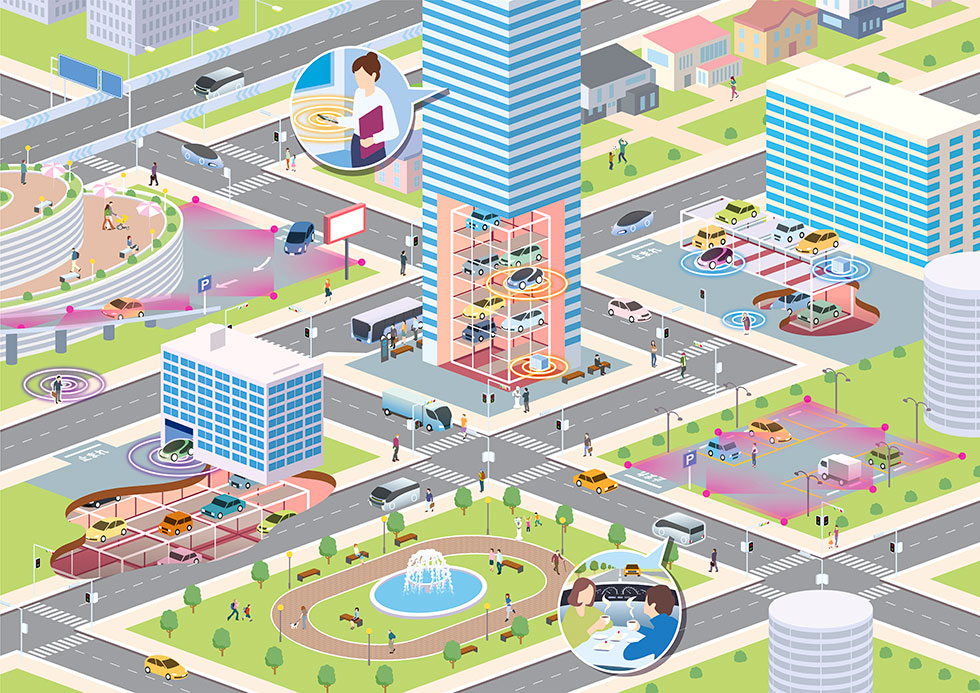Research on realization for use of parking systems for AVs
Aiming for improvement in mechanical car parking systems value
Research and development of parking equipment for AVs
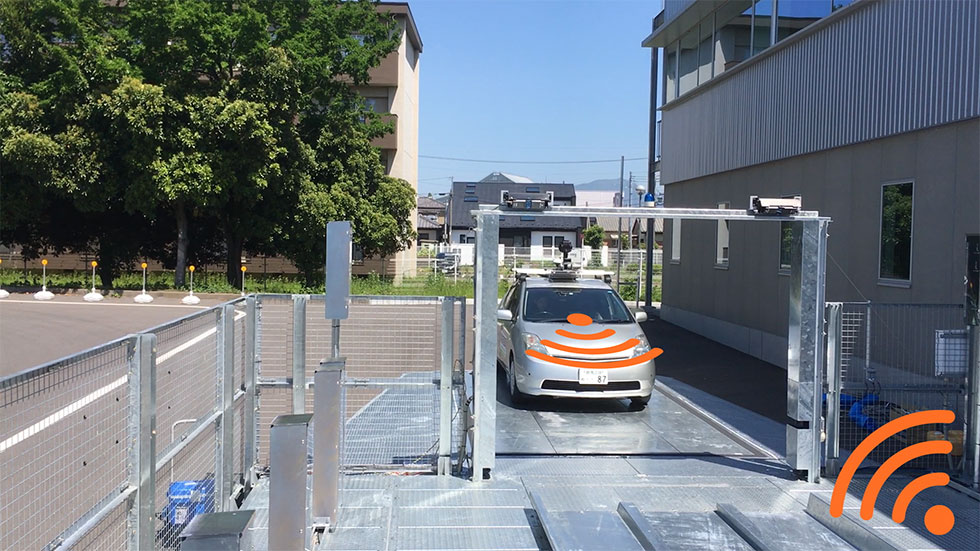
Background of development
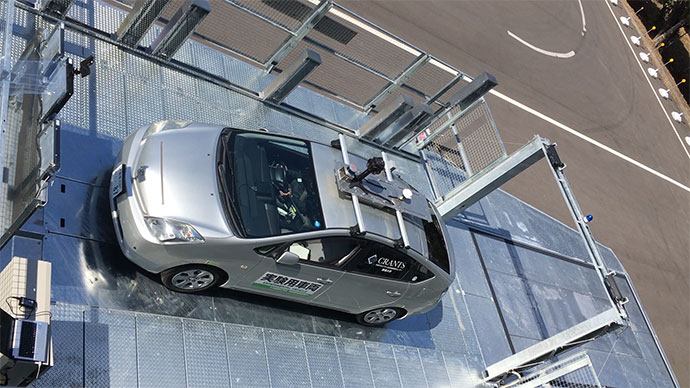
The autonomous driving technology which is the key to promote the automotive revolution know to occur "once in 100 years" has achieved a remarkable evolution, mainly led by automobile manufacturers and IT related companies. However, linking with the infrastructure side has not yet materialized from the viewpoint of vehicles being able to park automatically in mechanical car parking system (hereinafter parking equipment), which is indispensable for the effective use of land in urban areas.
Expansion of the role of parking equipment towards the proliferation of autonomous vehicles (hereinafter AVs) is also expected, including the requirement of control by linking to infrastructures due to the low possibility of realizing complete autonomous driving and parking, because costly equipment is required just by improving the autonomous driving functions of vehicles in underground facilities and buildings where the global positioning system (GPS) cannot reach.
In addition, according to the results of an investigation where about 27% of the automobile accidents* occur in parking lots including flat parking lots and automated parking towers, the expectation of eliminating physical injuries is also increasing, because completely unmanned parking lots can be realized by linking the parking equipment with AVs.
- *Source:"Monitoring Survey for Vehicle Accident Conditions of Six Prefectures in Tohoku"
(January to December 2017) conducted by The General Insurance Association of Japan Tohoku Branch
ShinMaywa's solution
Since the development of parking equipment started in 1963, ShinMaywa has been providing products and services related to parking equipment for more than 50 years. In December 2017, in order to start research and development targeting AVs, we started collaborative research with Gunma University which is promoting independent development towards practical application of AVs.
In July 2019, in tests conducted in the "Center for Research on Adoption of NextGen Transportation Systems" of Gunma University, we accomplished the industry's first parking of a vehicle in parking equipment for verification of a AV, where the realizability of automatically parking a vehicle in parking equipment, which requires higher driving skills compared with parking on a flat surface could be demonstrated.
This demonstration test proved that parking equipment is able to navigate an AV to a parking space safely at high accuracy by establishment of the "V2P (system which connects an AV (V) and parking equipment (P) via communication)."
In December 2020, we commenced a series of demonstration tests of two-level, multi-storied car parking systems and elevator type car parking systems (test systems) at our Head Office site. Then in February 2021, we achieved industry-first autonomous reverse parking of an AV in a two-level, multi-storied car parking system. At the same time, we developed and built a vehicle guidance system, including control system, and established automated valet parking technology.
Assuming that vehicles driven by people and AVs will coexist during the transition stage until fully AVs become popular, ShinMaywa has been exploring an expansion of the roles of parking equipment based on verification data with the aim of ultimately satisfying "Level 4" AVs, where people do not intervene in the driving under specific conditions.
Comments of Development Site
Associate Professor Ogitsu
Deputy Director, Center for Research on Adoption of NextGen Transportation Systems,
Gunma University
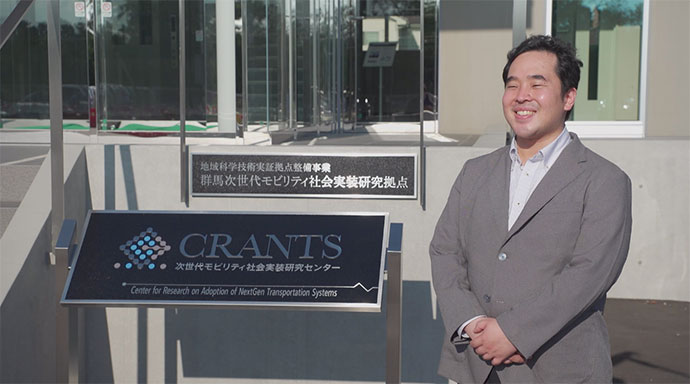
During the research aiming for social implementation of AVs, I started to believe that the link with infrastructures is essential especially in urban areas, not only improvements in the vehicle functions, in order to proliferate AVs. Accordingly, I came to the conclusion that parking a vehicle anywhere produces value therefore, ShinMaywa is a reliable partner for our center which is facing the action of "parking" a vehicle for the first time. With demonstration tests completed at Takarazuka, and AVs now able to use mechanical car parking systems, it felt like we had finally achieved great progress and were on the cusp of full implementation.
Going forward, we will continue our research into use of autonomous driving technologies to address social issues.
Mr. Ishida
Business Planning Office, Parking Systems Division
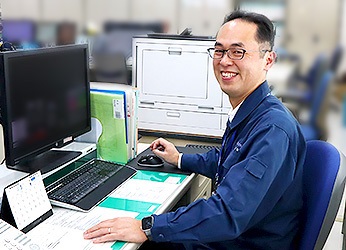
Commercially available passenger cars are increasingly being equipped with an automatic parking function and autonomous driving function however, the Instructions Manual currently warns that the vehicle "cannot be parked in parking equipment." For this reason, I felt a sense of crisis that parking equipment only will be left behind while the development of autonomous driving advances.
In the meantime, we had the opportunity to perform collaborative research with Professor Ogitsu of Gunma University who is an expert in the research of autonomous driving, and started the research and development of a new field. Although I face technical difficulties some times because this is totally new research, since we can exchange information mutually based on the advantages of the industry-university cooperation, I feel the attraction of simply being able to improve each other's technology.
We have completed the first trial of "communicating with a vehicle" successfully in this demonstration test.
Since, the demonstration test had suceeded in Takarazuka, not only "parking a vehicle," but so that a vehicle flow line in the parking equipment where the GPS cannot reach, and to the parking equipment on site can also be navigated from the infrastructure side.
We would like to become a presence which can play an important role in the social implementation of autonomous driving through the construction of a mechanism.
